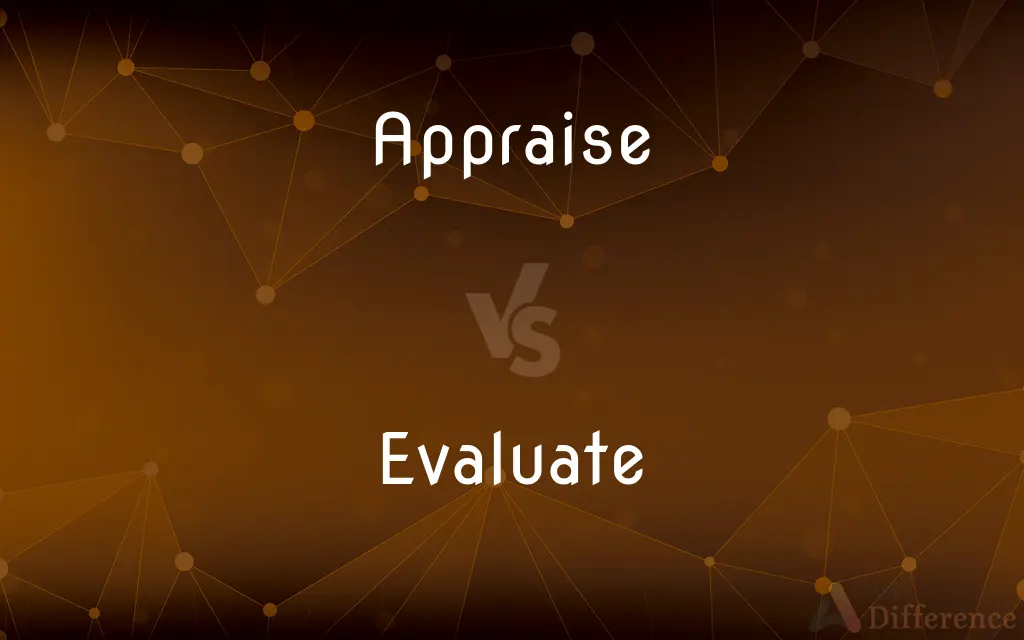Appraise vs. Evaluate — What's the Difference?
By Fiza Rafique & Maham Liaqat — Updated on March 30, 2024
Appraise generally means to assess the value or quality of something, often with a focus on determining its worth in monetary terms. Evaluate, however, involves assessing or examining something to determine its value, significance, or condition.

Difference Between Appraise and Evaluate
Table of Contents
ADVERTISEMENT
Key Differences
Appraise is typically used in contexts where the emphasis is on estimating the monetary value of an object, such as real estate, antiques, or artworks. It involves a professional judgment that often requires expertise in a specific field, aiming to establish an item's market value or worth. Whereas, evaluate encompasses a wider range of assessment activities, not limited to monetary value. It includes analyzing, comparing, and determining the significance, effectiveness, or condition of various subjects, from academic performance to business strategies.
In the real estate industry, appraising a property involves detailed inspections and comparisons with similar properties to determine its market value, crucial for sales, insurance, and taxation purposes. On the other hand, evaluating a real estate investment might consider factors beyond just market value, such as potential rental income, location desirability, and long-term appreciation prospects.
Appraisal often requires adherence to standardized methods and criteria, especially in formal settings like financial assessments or insurance valuations. Evaluation, however, can be more subjective and versatile, employing various criteria and methodologies depending on the object of evaluation and the specific goals of the assessment, such as in educational settings or program effectiveness studies.
The outcome of an appraisal is typically a quantitative figure, such as a price or cost, providing a definitive value assessment. Conversely, the outcome of an evaluation might be qualitative or quantitative, offering insights into quality, effectiveness, feasibility, or other dimensions that can inform decision-making processes.
While appraisals are commonly sought for transactions, insurance, or legal matters requiring certified valuations, evaluations are conducted for a broader range of purposes, including academic assessments, project evaluations, and performance reviews, highlighting their differing scopes and applications.
ADVERTISEMENT
Comparison Chart
Definition
Assessing the monetary value.
Assessing value, significance, or condition.
Contexts
Real estate, antiques, artwork.
Academic performance, business strategies, programs.
Focus
Monetary worth or market value.
Broader assessment including quality, effectiveness.
Methodology
Standardized methods and criteria.
Can be subjective, employing various criteria.
Outcome
Quantitative figure (price or cost).
Qualitative or quantitative insights.
Compare with Definitions
Appraise
Real estate valuation.
The house was appraised before listing it for sale.
Evaluate
Program assessment.
The non-profit evaluated the success of its outreach program.
Appraise
Jewelry appraisal.
The diamond ring was appraised for insurance purposes.
Evaluate
Assessing effectiveness.
The company evaluated the new marketing strategy's impact.
Appraise
Artwork assessment.
The museum appraised the sculpture to verify its authenticity.
Evaluate
Academic grading.
The teacher evaluated the students' exams for final grades.
Appraise
Antique valuation.
The antique vase was appraised at an auction.
Evaluate
Product testing.
Consumers evaluated the usability of the new software update.
Appraise
Determining monetary value.
The expert appraised the painting at $50,000.
Evaluate
Performance review.
Employees are evaluated on their yearly achievements.
Appraise
Assess the value or quality of
There is a need to appraise existing techniques
Evaluate
Form an idea of the amount, number, or value of; assess
The study will assist in evaluating the impact of recent changes
A system for evaluating how well the firm is performing
Appraise
To estimate the price or value of
Appraise a diamond.
Appraise real estate.
Evaluate
Find a numerical expression or equivalent for (an equation, formula, or function)
Substitute numbers in a simple formula and evaluate the answer
Appraise
To make a considered judgment about; assess or size up
Appraise a threat.
Appraised himself in the mirror.
Evaluate
To ascertain or fix the value or amount of
Evaluate the damage from the flood.
Appraise
(transitive) To determine the value or worth of (something), particularly as a person appointed for this purpose.
To appraise goods and chattels
Evaluate
To determine the importance, effectiveness, or worth of; assess
Evaluate teacher performance.
Appraise
(transitive) To consider comprehensively.
Evaluate
(Mathematics) To calculate the numerical value of; express numerically.
Appraise
(transitive) To judge the performance of someone, especially a worker.
At the end of the contract, you will be appraised by your line manager.
Evaluate
(transitive) To draw conclusions from examining; to assess.
It will take several years to evaluate the material gathered in the survey.
Appraise
(transitive) To estimate; to conjecture.
Evaluate
To compute or determine the value of (an expression).
Evaluate this integral.
Appraise
(transitive) To praise; to commend.
Evaluate
To return or have a specific value.
Appraise
To apprise, inform.
Evaluate
To fix the value of; to rate; to appraise.
Appraise
To set a value; to estimate the worth of, particularly by persons appointed for the purpose; as, to appraise goods and chattels.
Evaluate
Place a value on; judge the worth of something;
I will have the family jewels appraised by a professional
Appraise
To estimate; to conjecture.
Enoch . . . appraised his weight.
Appraise
To praise; to commend.
Appraised the Lycian custom.
Appraise
Place a value on; judge the worth of something;
I will have the family jewels appraised by a professional
Appraise
Consider in a comprehensive way;
He appraised the situation carefully before acting
Common Curiosities
What role does context play in choosing between appraisal and evaluation?
Context is crucial; appraisals are chosen when a monetary value assessment is needed, while evaluations are conducted to understand broader aspects such as quality, effectiveness, or condition.
Are appraisals and evaluations interchangeable in legal contexts?
In legal contexts, the terms are not interchangeable; appraisals are often legally required for determining value, whereas evaluations might be used for broader assessments without a focus on monetary worth.
Is a professional certification needed to appraise or evaluate?
Professional certification is often required for appraisals, especially in formal settings like real estate or insurance, whereas evaluations can be conducted by professionals or laypersons, depending on the criteria and context.
Can an evaluation be quantitative?
Yes, evaluations can be quantitative (involving numerical measurements) or qualitative (involving descriptions of qualities or conditions), depending on what is being assessed.
What is the main difference between appraise and evaluate?
The main difference lies in the focus: appraise is primarily about determining monetary value, while evaluate encompasses a broader assessment of value, significance, or condition.
Can the same object be both appraised and evaluated?
Yes, an object can be appraised for its monetary value and evaluated for other qualities or effectiveness, depending on the context.
How do methodologies differ between appraising and evaluating?
Appraising typically uses standardized methods and criteria for assessing monetary value, while evaluating may employ a variety of criteria and methods to assess quality, effectiveness, or significance.
Why is appraisal important in insurance?
Appraisal is important in insurance to determine the monetary value of an insured item, ensuring appropriate coverage amounts and compensation for losses.
How does an evaluation inform decision-making?
An evaluation provides insights into the effectiveness, quality, or condition of something, helping stakeholders make informed decisions based on those assessments.
How do cultural perceptions affect appraisals and evaluations?
Cultural perceptions can influence what is considered valuable or effective, thus affecting both appraisals and evaluations in terms of importance, methodology, and outcomes.
Share Your Discovery

Previous Comparison
Component vs. Feature
Next Comparison
Affect vs. InfluenceAuthor Spotlight
Written by
Fiza RafiqueFiza Rafique is a skilled content writer at AskDifference.com, where she meticulously refines and enhances written pieces. Drawing from her vast editorial expertise, Fiza ensures clarity, accuracy, and precision in every article. Passionate about language, she continually seeks to elevate the quality of content for readers worldwide.
Co-written by
Maham Liaqat















































